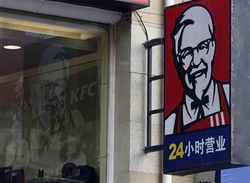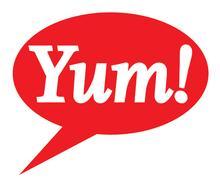 Chinese consumers' anger at KFC over a food safety scare has abated as the number of negative posts about the fast food chain owned by Yum Brands Inc on the country's most popular microblogging platform fell by two-thirds.
Chinese consumers' anger at KFC over a food safety scare has abated as the number of negative posts about the fast food chain owned by Yum Brands Inc on the country's most popular microblogging platform fell by two-thirds.China's half a billion microbloggers posted 3 million overwhelmingly negative comments about KFC in the month that began on Dec. 18, when state media started reporting on the scare over contaminated chicken, a Reuters review of data from the Twitter-like platform Weibo shows.
The number fell from Jan. 18 to Feb. 18, but microbloggers still posted more than 1 million comments on KFC, indicating that the largest foreign fast food chain in China still has its work cut out for it as it tries to reverse a steep sales slide.
Yum will release China sales figures for February at around 2000 GMT, the first time it is singling out data from the market that accounts just over half of its overall sales.
Yum has estimated that same-store sales for the January-February period would be down 25 percent.
For January, they fell 37 percent, indicating that the company is anticipating a modest pickup in February, a month that included the week-long Lunar New Year holiday, which traditionally boosts restaurant sales. The holiday fell in January in 2012.
Jack Russo, senior consumer analyst covering Yum for brokerage Edward Jones, believes the drop in negative online traffic also helped lift February sales. "I would have to think consumer anger towards Yum has dissipated since the initial outrage," he said.

Kentucky-based Yum's reputation for serving high-quality meals in China, where food contamination is a chronic problem, was tarnished after news reports and government investigations focused on chemical residue found in a small portion of its chicken supply.
Most of Yum's nearly 5,300 restaurants in China are KFCs.
The company was not fined by the food safety authorities, but microblogs show that Yum, widely seen as a model for how to do business in the Chinese market, still has far to go to regain its customers' trust.
"I strictly won't eat KFC, even though they have apologised. Perhaps they were pressured to apologise and will keep breaking the rules anyway," posted 'Tiger Won't Eat Meat' on Weibo.
Weibo user Cherrybobo was also indignant in a recent post: "To choose the best chicken for us? KFC, you are such a liar! Have you ever really apologised to us?"
Yum officials in the United States declined to comment for this story.
YUM RESPONSE SEEN MUTED
After the scandal broke, Yum issued an official apology on Weibo, launched an online poetry competition to highlight food safety and announced it would stop using smaller chicken suppliers that have not modernised their operations. It didn't, however, give specifics on any additional steps to shore up food safety.
"The response from Yum has been somewhat restrained," said David Mahon, Beijing-based managing director of Mahon China Investment Management. Yum also operates Pizza Hut, East Dawning and Little Sheep brands in China.
"If they want to recover and carry on the speed of growth that they had before in China, then this response is wanting."
Yum said last month KFC same-store sales in China should turn up by the fourth quarter 2013, based on its experience with food safety scandals in the past, but warned that it expects its 2013 earnings to shrink rather than grow.
Yum's problems in China are, for now, playing into the hands of rival, beef-focused fast food chains McDonald's Corp and Burger King Corp.
"I think chicken is unsafe nowadays, so I prefer eating beef instead," said bank worker Grace, 25, at a crowded Burger King outlet in Shanghai.
It may, however, get help from an unlikely saviour: China's patchy food safety record.
"I think all the food in China is kind of unsafe, so I still generally trust KFC. I eat here because I like the taste," said a 24-year-old a bank clerk who identified himself as Shawn as he ate lunch at a Shanghai KFC restaurant.





